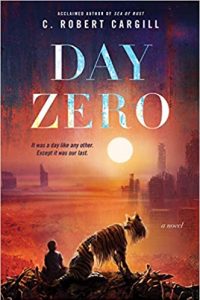Paul Di Filippo Reviews Day Zero by C. Robert Cargill
 Day Zero, C. Robert Cargill (Harper Voyager 978-0062405807, $27.99, 304pp, hc) May 2021.
Day Zero, C. Robert Cargill (Harper Voyager 978-0062405807, $27.99, 304pp, hc) May 2021.
This era seems a Golden Age for fictional examinations of artificial intelligence, plumbing the deeper meaning of robot consciousness and even silicon emotions. With recent novels such as Today I Am Carey, Set My Heart to Five, Barren Cove, and The Hierarchies, along with films like Ex Machina, Zoe, Blade Runner 2049, and Chappie, contemporary science fiction has refined and deepened the Golden Age and Silver Age tropes involving synthetic beings of humanity’s devising.
(Of course, the Ur-engine for all of this is probably a 20-year-old film: Spielberg’s A.I. Artificial Intelligence.)
So far has the depiction of robots, androids and other manufactured sentients progressed that sometimes the writer can dispense with humanity entirely. Such was the scenario in Robert Cargill’s Sea of Rust, which I reviewed here at our site, deeming it “[a] narrative…stuffed with battles, explosions, danger, escapes and pitfalls. The language is vivid and colorful, truly cinematic… [The robots] debate their relationships with the extinct humans–who is superior, who inferior?–and try to hash out the ancient paradox of the Ship of Theseus: how much of an entity can be replaced before it is no longer the same entity?” (Interesting to see that ancient metaphor taken up by the popular WandaVision as well.)
Cargill’s newest is a prequel, limning how his robot-only future came to be. By the very existence of Sea of Rust, we know that the humans are ultimately doomed. But this spoiler knowledge quickly fades into the background of the reader’s consciousness as the powerful immediacy of the prequel story takes over, rendering this book just as engaging as its predecessor, despite its be-fatedness.
At some point in the future long enough for robots to have been established for several generations (of humans and robots both), a social-justice movement is underway to emancipate at least a few lucky automatons. (Parallels to events of 2020 and 2021 are evident but not belabored, including the chuckle-provoking reference to “Ocasio-Cortez Elementary School.”) This movement has its cyber-leader in the form of a free robot named Isaac. (Yes, an obvious nod to Asimov, made explicit by a later reference to The Three Laws.) But when Isaac and all his followers are slaughtered by an EMP blast, open warfare breaks out between the fleshies and the fabricateds.
What is our conduit to this future scene? The engaging first-person narration of Pounce, a sizable, be-furred, bipedal, tiger-shaped nanny-bot. Pounce lives happily and naively in the household of Sylvia and Bradley Reinhart in the metroplex of Austintonio, and tends faithfully to eight-year-old Ezra, to whom he is devoted—not only by his programming but by free-will affirmation of love. A domestic bot named Ariadne rounds out the establishment.
We witness the daily routine to give us a feeling of stability and comfort before the whole world collapses with Isaac’s assassination. Soon, in a sequence of events I won’t divulge, Pounce and Ezra find themselves exiled from Eden and on the run, fleeing killer bots at every turn. Their only hope is to reach a probable redoubt of humanity some miles outside the conurbation—but how a young boy and a nanny-bot can avoid be killed at every step remains to be seen.
Suffice it to say that Pounce quickly discovers his inner warrior—quite literally—while Ezra mans up also. (The boy’s portrait is drawn well through its arc, although he is definitely secondary to Pounce and his journey.) The time frame of the tale is very compressed—just a few days—but into this short span is stuffed a wealth of allies, battles, venues, enemies (the supercomputer CISSUS, who uses individual robots as its limbs, is the prime evil), emotional interludes, and philosophical speculations on free will, education, loyalty, rebellion, the possibility of true friendship and love between robots and humans, and the need to follow one’s bliss.
Pounce’s mentality and that of his fellow bots is suitably non-human to convince us of their ontological reality, although not as pronouncedly alien as that of the bots in Sea of Rust—probably because these earlier bots still live in the human sphere. However, some of the dialogue between the robots during the later fight scenes does approach the self-parodic action hero standard, and might just as well have been exchanged between, say, Bruce Willis and sidekick.
“Pounce?” he asked, using a tone that meant quite clearly What the hell are you doing?
“When I stop, you jump out and take whatever is left.”
“I don’t like this plan as much as the last one.”
“I don’t like it either. But the element of surprise right now is the only thing we have to work with.”
“Shit,” he muttered softly.
“Yeah, shit.”
However, this is a trivial objection to what is essentially a nicely executed and rousing apocalyptic love story between two unlikely comrades, a la Ellison’s “A Boy and His Dog.” Allied to similar tales of the uprising of chimeras (see Robert Repino’s War With No Name series and Adam Roberts’s Bête), this novel examines quite cleverly some deep philosophical conundrums about the nature of mismatched intelligences in conflict, while also providing a cinematic boatload of kinetically delivered cyber-smashing to get the reader’s pulse pounding as rapidly as his or her thoughts are flowing.
 While you are here, please take a moment to support Locus with a one-time or recurring donation. We rely on reader donations to keep the magazine and site going, and would like to keep the site paywall free, but WE NEED YOUR FINANCIAL SUPPORT to continue quality coverage of the science fiction and fantasy field.
While you are here, please take a moment to support Locus with a one-time or recurring donation. We rely on reader donations to keep the magazine and site going, and would like to keep the site paywall free, but WE NEED YOUR FINANCIAL SUPPORT to continue quality coverage of the science fiction and fantasy field.
©Locus Magazine. Copyrighted material may not be republished without permission of LSFF.








I really liked this book, but found it odd to have portrayed Trump supporters as violent here in the ashy aftermath of the Summer of Fire But Mostly Peace. It is annoying when writers can’t separate their political agendas from the fiction they write.